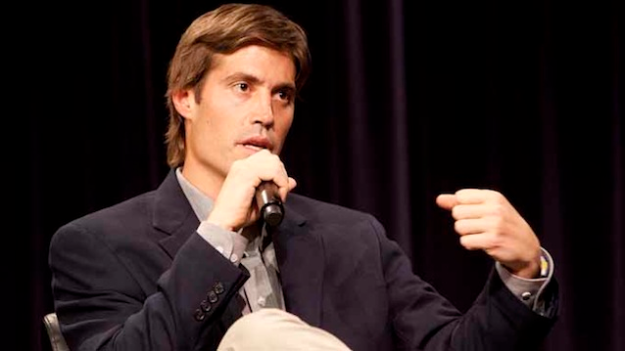
Christian Science Center in Boston. Photo (cc) 2014 by Bill Damon.
In my undergraduate media ethics class the other day, my students and I talked about whether coverage of the war between Israel and Hamas is contributing to a sense of hopelessness. There is, in fact, so much legitimately terrible news that it’s hard to be optimistic about the prospects for peace and justice. Yet it’s important that we try.
One often-overlooked resource for times like this is located right here in Boston: The Christian Science Monitor, a 115-year-old publication that at one time was a highly influential news organization and that still does good work through its newsletters and website. As its homepage puts it, “the Monitor offers a story of our common challenges, and how we can begin to find solutions and credible hope.”
We listened to a 15-minute interview with Monitor journalist Ned Temko on why he thinks the current war, horrific as it is, might lead to a decent outcome. Temko certainly isn’t blind to the realities. This, for instance, is pretty bleak:
There is nothing, in my 40-plus years of covering both sides, that has been so wantonly violent against civilians, intentionally, as the October 7th attacks. It helps explain the ferocity of the intended Israeli response. I think psychologically and emotionally, it’s deeply changed how Israelis feel about their own army, their government, about the Palestinians, certainly about Hamas. And on the Palestinian side, as you point out, it’s kind of revived this sense of displacement because something like a million Palestinians in Gaza have been forced to the south of the Gaza Strip in anticipation of a major Israeli ground thrust into the north of Gaza.
But Temko adds that he is “hopeful” that the conflict between Israel and the Palestinians has reached such a terrible impasse that it may actually lead to a resolution — not soon, but in the years ahead. He explains:
I’ve had the good fortune not only to have covered this for a very, very long time, but to have covered both sides. I got to know both sides of this conflict on a human level. And if I can make the case for hope, unlikely though it seems now, I think it’s the following, that all the other options to this decades long conflict have been tried. Some resolution has sometimes been close, and I’ve covered that as well, but always ultimately failed. I think what’s different this time around is the immediacy, the visceral sense in which people on both sides have felt that this conflict is inescapably part of their lives, and not in a good way. That there is, for each of them, a dawning realization that their own interests in a stable, secure existence, in which they have a future, depends on some sort of resolution of this core dispute.
After we listened to the interview with Temko, we divided the class into five teams. Each was asked to find a story about the conflict that emphasized solutions, hope and optimism. Here is what they came up with:
• “‘I Love You. I Am Sorry’: One Jew, One Muslim and a Friendship Tested by War,” by Kurt Streeter, The New York Times, Oct. 22. An account of a friendship between two women in Los Angeles, one Muslim, one Jewish. “Their close friendship,” Streeter wrote, “signals that the ties that bind adherents of Judaism and Islam can remain strong, even as the war pitting people of their faiths against each other rages.”
• “Peace activists in Israel speak about their hopes for the end of war,” interview by Scott Simon, NPR, Oct. 21. Simon spoke with Sally Abed, an Israeli Palestinian, and Alon-Lee Green of the organization Standing Together. Green told Simon that “we see a lot of anger and a lot of feelings of revenge. And we do understand these feelings, but we do say in the clearest way possible, more killing of innocent people, more bloodshed, more feeding of this vicious circle of death and blood will not bring back anyone to life.”
• “‘Let Gaza Live’: Calls for Cease-Fire Fill Grand Central Station,” by Claire Fahy, Julian Roberts-Grmela and Sean Piccoli, The New York Times, Oct. 31. On the surface, this story doesn’t inspire much in the way of optimism. The protest that is described was organized by Jewish Voice for Peace, an explicitly anti-Zionist organization, and it led to more than 300 arrests on charges of trespass and disorderly conduct. But it’s hard to disagree with the sentiment expressed in a sign that some of the protesters unveiled: “Never Again for Anyone.”
• “‘I hope it can endure’: examples of Jewish-Arab solidarity offer hope in Israel,” by Bethan McKernan, The Guardian, Oct. 15. Abed and Green of Standing Together make another appearance in this story, was reported from Jerusalem. Wrote McKernan: “Thousands of volunteers of different ethnicities are working to help victims of the violence and clean up neglected bomb shelters, amid many other efforts at calming the heightened tensions around the country.”
• “Opinion: We are a Palestinian and an Israeli in Los Angeles. We find comfort and hope in mourning together,” by Rana Shalhoub and Hila Keren, The Los Angeles Times, Oct. 17. These are not the same two Los Angeles women profiled by The New York Times. “Of course, our close connection does not mean we agree on all aspects of this catastrophic situation,” Shalhoub and Keren wrote. “But we feel grateful that our true care for each other has at least allowed us to unite around two things. One relates to the present: the value of mourning together all loss of innocent human life. The other relates to the future: the belief that humanity on both sides is key to breaking the vicious circle created by hate.”
Leave a comment | Read comments







